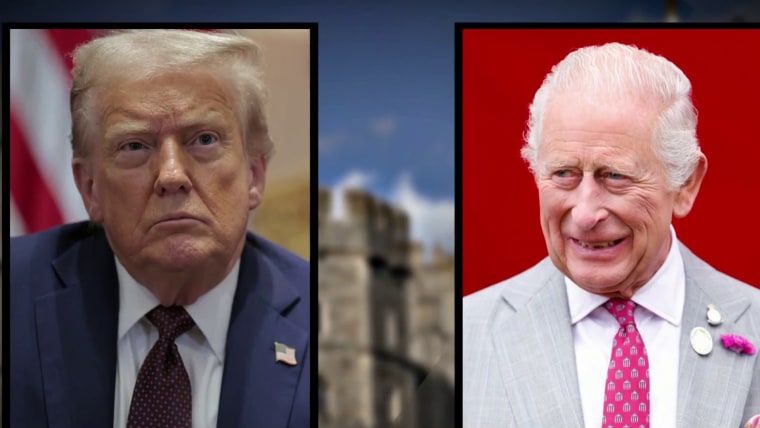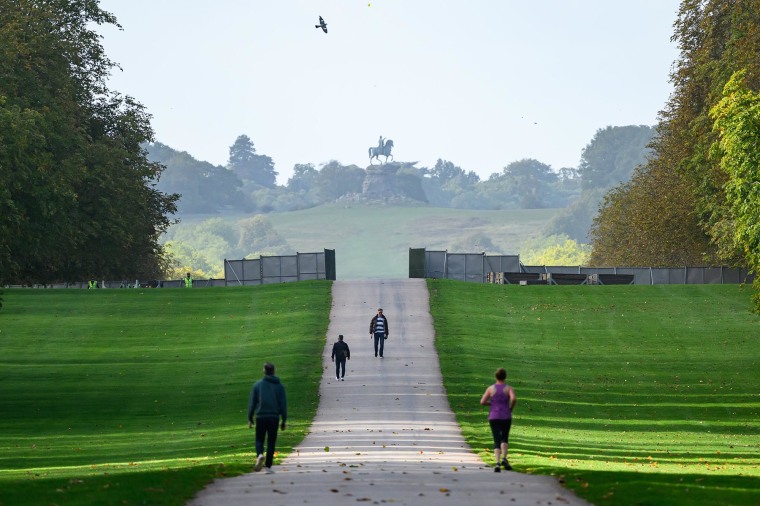LONDON — U.S. President Donald Trump will touch down today in a country whose king is prepared to fete him, and whose citizenry roundly dislikes him.
Happily for the president, he will see a lot of King Charles III and little of everyday Britons in a two-day trip where he’ll make history as the first elected leader to receive not one but two state visits courtesy of the royal family.
Looming over Trump’s arrival in Europe is the war playing out on the east end of the continent. Hostilities between Russia and Ukraine took an escalatory turn last week when Russian drones entered Poland’s airspace and were shot down.
The incident renewed fears that Russian President Vladimir Putin may widen the conflict and threaten other European democracies unless he is stopped. As the war grinds on, Trump’s effort to make peace has stalled, giving rise to complaints among some diplomats and members of Congress that he is not putting enough pressure on Putin to halt the attacks.

The war figures to come up when Trump meets privately on Thursday with British Prime Minister Keir Starmer at Chequers, his official country residence outside London. There, the two leaders will view the archives of former Prime Minister Winston Churchill.
The symbolism is unmistakable. Churchill and former President Franklin D. Roosevelt forged an invaluable friendship as they joined to fight Nazi Germany in World War II. Russia was part of the troika that defeated Adolf Hitler.
Now, the West faces threats from a Russian dictatorial regime, and Europe again is beseeching the U.S. president to come to its aid.
Whether Trump is on board seems to depend on the day. He has sent mixed signals about responsibility for the war, which began in 2022 when Russia sent tanks and troops rolling into Ukraine. Ukrainian President Volodymyr Zelenskyy rallied his country and prevented a quick rout. In a post on his social media site Saturday, Trump wrote that the war is not his. Rather, he wrote, “it is [former President Joe] Biden’s and Zelenskyy’s war.” He did not mention Putin.
But speaking to reporters the following day, he cast Russia as the “aggressor.”
Trump said over the weekend that he is prepared to slap “major” sanctions on Russia, but first wants all 32 nations in the NATO military alliance to stop buying Russian oil.
“I hope that the leaders who meet Trump these days behind closed doors are very frank about it,” Marko Mikhelson, who chairs the foreign affairs committee in Estonia’s parliament, said in an interview. “If Mr. Trump thinks that this is not his war or he— that he can run away and that Ukraine is somehow a faraway country, that would be an epic mistake.”
First, though, comes the pomp. World leaders have long used flattery in attempting to win favor with Trump. In this instance, Starmer hand-delivered an invitation from King Charles during a meeting in the Oval Office in February. Trump’s last state visit in 2019 was a “tremendous success,” gushed Starmer, who is relying on Trump to stand up for Ukraine and prevent further Russian aggression.
“Every time the European Union tries to push against Trump, they’ve gone to incredible efforts to butter him up,” said Michael Bociurkiw, a senior fellow at the Atlantic Council think tank. He mentioned that Mark Rutte, secretary-general of the NATO military alliance, called Trump “Daddy” at a summit in June and how European leaders praised Trump during a visit to the White House in August to discuss the war, likening them to a “cheerleading squad meeting with the football coach.”
The upcoming state dinner “is another iteration of what has become the strategy for dealing with Trump,” said Michael McFaul, who was ambassador to Russia during the Obama administration.
“I’m not surprised that they [the British] are going to do it and because of our cultural and historical connections, they can do it like virtually no other country in the world,” he continued.
A group called the “Stop Trump Coalition” is staging a protest during Trump’s visit, but he isn’t likely to see it. He’ll be an overnight guest of the king and of Queen Camilla at Windsor Castle on Wednesday and will join the royal couple for a carriage procession inside the private estate. By contrast, when French President Emmanuel Macron visited earlier this year, his carriage ride took him through the town of Windsor.

Trump’s carriage ride will follow a route lined with soldiers; military bands will play the national anthems of both countries.
The welcoming ceremony for Trump at Windsor Castle will involve the largest military contingent for a visiting foreign leader in living memory. More than 1,300 military personnel and 120 horses are to take part.
After lunch at the castle, the president and First Lady Melania Trump will visit St. George’s Chapel on the grounds, where they will lay a wreath on the tomb of Queen Elizabeth II.
“It’s going to be incredible. It’s such a great honor,” Trump told NBC News in a weekend interview.
“I look forward to saying hello to Charles and Camilla,” he said.
Trump’s stint with the royal family will be capped by a state banquet at the castle, where he and the king will both give speeches.
On Thursday, Trump moves to Chequers to meet Starmer.
Trump had promised to use his negotiating skills to make peace, but if anything, a deal looks more remote now than when he took office, some of Ukraine’s supporters contend. Russia’s daily missile attacks against Ukraine have shown dramatic spikes over the past three months, according to a graph compiled by the Center for Strategic & International Studies.
Rep. Don Bacon, R-Neb., who is not running for re-election next year, said in an interview that Trump risks being “a weak guy in history if he keeps going down this path.”
“He says it’s not his war?” Bacon continued. “Well, it’s his war now and he better become responsible on this and lead America as the world’s most powerful nation for freedom.”
Ben Hodges, a retired three-star general who commanded the U.S. Army in Europe, believes that the Russian drones downed in Poland were “a rehearsal by the Russians to keep pushing, trying to assess our level of readiness.”
He said the Russian drone incident showed that the Kremlin has “absolutely zero fear that the U.S. is going to do something really meaningful.” (In a statement, Russia denied that Poland was targeted).
Before leaving for Britain in the morning, Trump spoke to reporters and sent a message to Zelenskyy.
He has to “get going and make a deal,” the president said.




